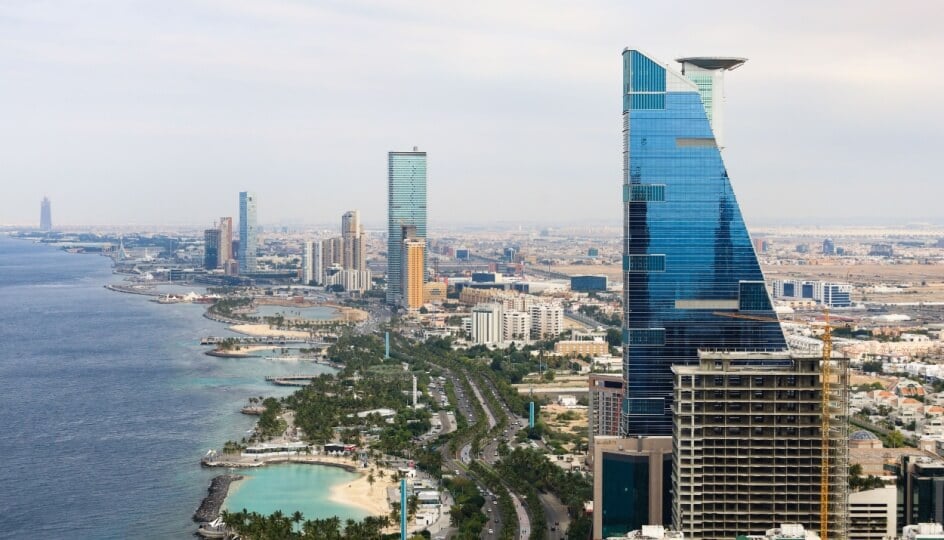Doing business in the UAE

The UAE continues to build its reputation as a destination of choice not only for tourism but also for relocation and business expansion. The government has invested heavily in providing world-class infrastructure, healthcare, education and a business-friendly environment that is attracting both regional and global organisations. However, there are a number of complexities to consider when setting up operations in the country, such as the introduction of its corporate tax regime.
The United Arab Emirates (UAE) is located in the southeast of the Arabian Peninsula and bordered by the Persian Gulf to the north, Oman to the east and Saudi Arabia to the south and west.
It is a constitutional federation of seven Emirates: Abu Dhabi, Dubai, Sharjah, Ajman, Umm Al-Qaiwain, Ras Al-Khaimah and Fujairah. The UAE is the Middle East’s third largest economy, and one of the wealthiest countries in the region on a per capita basis.
Since its formation in 1971, the UAE has developed rapidly and is now widely known for its modern infrastructure, international events and status as a trade and transport hub. The UAE was previously part of a British protectorate called the Trucial States.
| Fast facts: |
|
TMF Group’s Global Business Complexity Index (GBCI) shows the UAE is one of the world’s more complex jurisdictions when it comes to ease of doing business. Complexity has been on an upward trajectory in recent years, partly due to the UAE introducing a corporate tax regime to align with a global push towards a minimum corporate tax rate. It is therefore crucial for companies extending their operations into the UAE to thoroughly research the forces that are shaping its economic landscape.
Advantages of doing business in the UAE
The UAE is one of the most attractive business destinations in the Middle East and North Africa (MENA) region. In addition to its strong trade ties with many countries in both the MENA region and the wider world, the country’s stable political system, business environment and strategic geographical location are key drivers of its continued success.
Dubai is regarded as the commercial capital for the MENA region. It has a skilled expatriate population and a liberal trade regime that attracts capital from around the world. Abu Dhabi, the capital of the UAE, has traditionally been dependent on oil and gas revenue but has now diversified its economy. This has resulted in a number of new government projects, including the Masdar City for renewable energy and clean technologies, and the Etihad Rail project, which has acted as a catalyst for attracting foreign companies to the city. The UAE government also actively supports the growth of e-commerce and online businesses, recognising their important role in driving economic development and innovation.
Foreign businesses are drawn to the UAE for its free zones, which generally offer tax holidays and other incentives to businesses and their employees. These free zones, which have boosted foreign direct investment into the UAE, are focused on developing particular industries and provide dedicated high-end infrastructure.
There are 45 free zones across the seven Emirates, with Dubai alone offering more than 20, including the Dubai Airport Free Zone (DAFZ) and Dubai International Financial Centre (DIFC).
Risks of doing business in the UAE
Doing business in the UAE can be complicated due to a number of factors, such as economic risks, political risks and legal and regulatory challenges.
The country can also have relatively high operational costs, encompassing office space, visas and regulatory fees. Additionally, in some sectors, competition for investment can be fierce, making it harder for smaller or newer businesses to secure the funding they will need.
It is important to understand the local culture, which is tied to Islamic traditions. While foreigners are free to practice their own religion, they are expected to show the same level of respect to their hosts. Arabic is the official language, but English is widely used in business meetings and transactions in the UAE. However, all employment records, including contracts and other documents, such as instructions sent to employees, should be in Arabic. It is the prevailing language in the event of inconsistency in terms contained in English documents.
Regulatory compliance in the UAE
Companies active in the UAE must comply with a diverse and growing range of regulations.
The UAE has all the necessary laws pertaining to international standards of operating business activities, such as Common Reporting Standard (CRS), Base Erosion and Profit Shifting (BEPS) and Foreign Account Tax Compliance Act (FATCA).
Each free zone has its own laws and regulations, which can make doing business in the UAE a more complex affair. As highlighted earlier, there has generally been an upward trend for business complexity in recent years. This can be attributed to a number of factors, including the introduction of new regulations relating to ultimate beneficial owner (UBO) filing, the introduction of corporate income tax and the requirement to file audited financial statements in most jurisdictions to renew trade licences.
There are also comprehensive anti-money laundering (AML) reporting requirements, which are overseen by the Central Bank of the UAE (CBUAE). The CBUAE’s Anti-Money Laundering and Combating the Financing of Terrorism Supervision Department enforces the country’s AML laws and regulations.
The financial and tax environment in the UAE
The UAE recently introduced a corporate tax regime, reflecting the global movement towards a minimum corporate tax rate. The rate stands at 0% for income up to AED375,000 and 9% for income above this threshold.
Under this regime, businesses are categorised as either Taxable, Exempt or Qualifying Free Zone Persons (QFZP) and must first assess which category they fall under and then register accordingly. Certain exempt entities must still apply and receive approval. Companies unsure about the process should read our article to understand who is taxable and who is exempt.
While this development is a notable shift from the UAE’s long-standing reputation as a tax-friendly environment, the rates are still relatively low compared to global standards, underpinning the country’s commitment to maintaining its position as an international business hub.
VAT in the UAE is applied at a standard rate of 5%, with some goods and services subject to a 0% rate or an exemption from VAT (subject to specific conditions being met). This follows the ratification by the UAE of the Common VAT Agreement of the Gulf Cooperation Council (GCC) for the introduction of VAT across the GCC region.
Hiring and managing employees
The Labour Law (Labour Law 1980) has applied to the majority of employees in the UAE’s private sector, including expatriates and GCC nationals. This was updated in 2022 by Federal Decree-Law No. 33 of 2021 Regulating Labour Relations (new Labour Law 2022).
The newer provisions include equal pay protection and measures against sexual harassment, bullying and the use of verbal, physical or psychological violence by employers. However, certain categories of individuals are excluded, including members of the armed forces, domestic servants employed in private households and members of the police force. It is important for companies operating in the UAE to familiarise themselves with the local labour regulations in order to ensure compliance.
When it comes to hiring overseas talent, a work permit application must be accompanied by employer contracts and licences that prove the need to recruit foreign workers and clarify work locations. An application also needs a report that clarifies the timetable for the project and the number of workers involved. Typically, an employer must apply for an individual work permit for each worker they wish to recruit.
According to law, foreign employees are entitled to a lump sum end-of-service payment once they have finished their job. The exact amount depends on the number of years they have been working for the company, as well as varying provisions in both federal and local laws.
Many employers in the UAE now offer private pension schemes to their expat workforce. This is not mandatory, but many companies choose to offer this to improve the working conditions for expatriates. Generally, both employer and employee contribute around 5% of a full-time salary to such occupational pension schemes.
Starting a business in the UAE
With seven Emirates and 45 free zones for general or industry-specific activities spread across the UAE, registering and managing a business entity can be challenging.
The first thing to consider when incorporating in the UAE is whether to establish a free zone or mainland company. As outlined earlier, free zones were established to encourage foreign direct investment and each zone has its own laws and regulations.
The types of companies that can be established within free zones differ, but generally include subsidiaries and branch and representative offices. Entities established in a free zone can have 100% foreign ownership and no local service agent for a branch or representative office is required. While 100% foreign ownership is allowed in free zones, these entities are not allowed to conduct business on the mainland. Profit-seeking enterprises wishing to tap into the domestic market are required to register a mainland entity.
Understanding the key considerations for incorporating in the UAE can help companies to make a more informed decision on the approach that is right for their specific circumstances.
FAQs
1. What are the advantages associated with doing business in the UAE?
The UAE is now widely seen as one of the world’s most attractive business destinations. The country has a stable political system, an innovative business environment and a strategic geographical location between Europe, Asia and Africa.
Foreign businesses are drawn to the UAE for its skilled workforce, liberal trade regime and its free zones, which offer tax incentives and other benefits to businesses and their employees.
2. What is the working culture like in the UAE?
The local culture is tied to Islamic traditions. While foreign employees are free to practice their own religion, they are expected to show the same level of respect to their hosts. Arabic is the official language, but English is widely used in business meetings and transactions in the UAE.
Generally, the UAE workday runs for eight hours, from 9am to 5pm, while the workweek now runs from Monday to Friday. During the holy month of Ramadan, many companies adhere to reduced working hours for people who are fasting. Although timekeeping isn't a priority, the Emiratis respect punctuality and politeness in business interactions.
3. Are free zone companies exempt from corporate tax in the UAE?
Free zone entities are subject to UAE corporate tax, but will continue to have corporate tax incentives as long as they comply with all applicable regulatory requirements.
Learn more about corporate tax in the UAE here.
4. How do you open a bank account in Dubai?
To open a bank account in Dubai, you will need to provide documents to verify your identity and residency status.
The documents needed vary by bank, but typically include a passport and a copy of the visa page, an Emirates ID if one is held, proof of UAE residency (such as a utility bill), a salary certificate issued by a company’s HR department and a reference letter from a banker in the prospective account holder’s home country.
While opening a personal bank account is relatively easy, a corporate bank account can take months, and working with a local partner can help to simplify the process.
Find out more about doing business in the UAE by requesting our in-depth guide today.
Request now Request now




